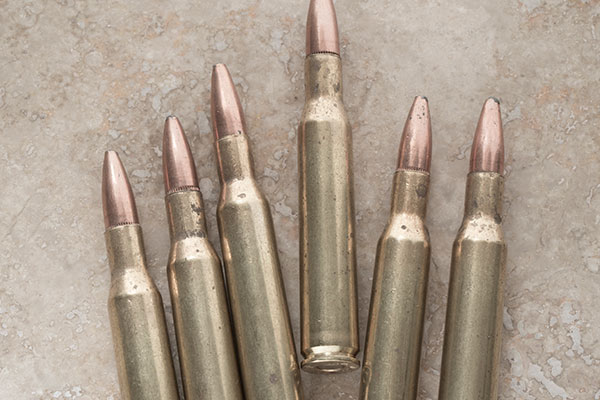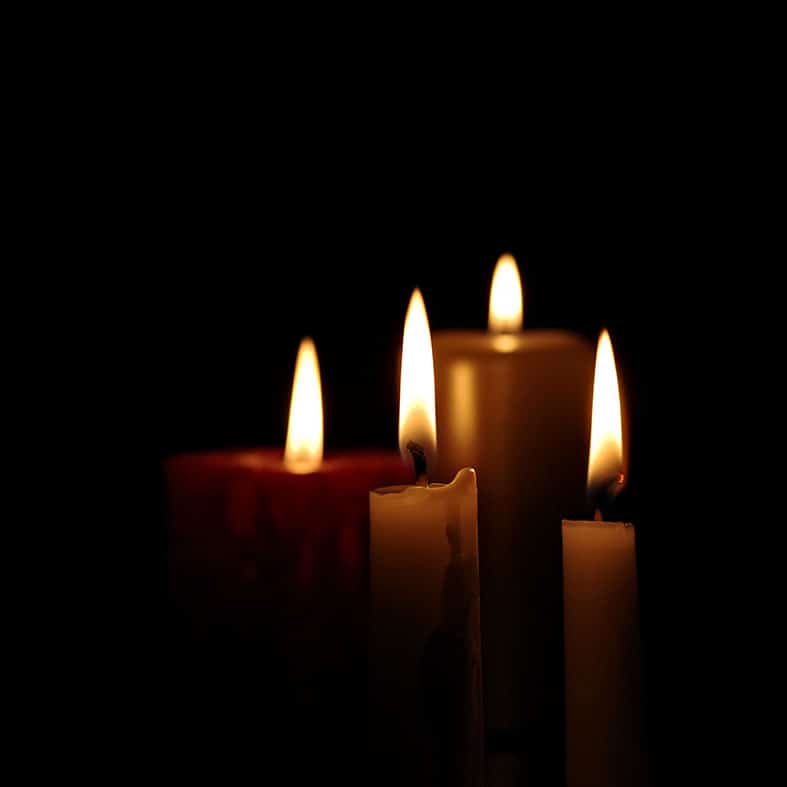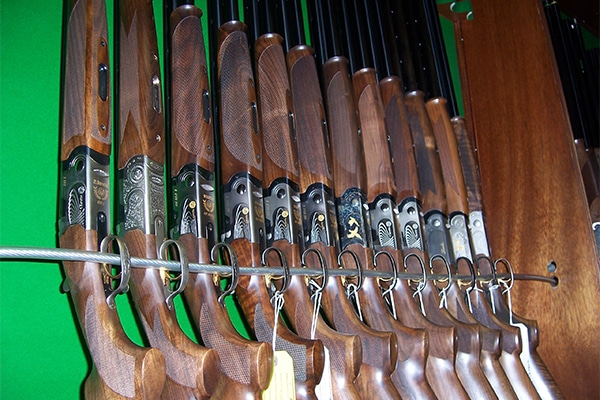
Calibres, cartridges and quarry: advice for firearms enquiry officers
An overview of different calibres and ammunition commonly used in the UK, alongside a summary of their appropriateness for different quarry species.
Get information on the legal shooting season for mammals and birds in the UK.
Apply for funding for your project or make a donation today
Comprehensive information and advice from our specialist firearms team.
Everything you need to know about shotgun, rifle and airgun ammunition.
Find our up-to-date information, advice and links to government resources.
Everything you need to know on firearms law and licensing.
All the latest news and advice on general licences and how they affect you.


Like taxes, death is an inevitability we all must face. For those of us who own guns we have a moral duty to try to ease the burden of our passing on those we leave behind.
Losing a loved one is traumatic enough without the extra worry of what to do with the contents of their gun cabinet. Here are some suggestions as to what you might do to make things easier for your executors and personal representatives after you have gone.
Mark a large envelope to the effect that it should only be opened after your death. Put the following things inside it:
This is a tricky area. It is an offence to disclose the whereabouts of your keys to a person not authorised to possess your guns. However, your executors will need to have access to your cabinet after you have died to dispose of your property on behalf of your estate.
You will need to strike a balance between guarding your keys during your lifetime and being found after a detailed search by your executors when you have died. Avoid choosing a complicated hiding place, otherwise your executors will never find them and you will probably forget where you put them. Equally don’t leave your keys on top of the cabinet as this would just make them a present to burglars.
In BASC’s experience, firearms licensing managers will bend over backwards to help the personal representatives of a deceased certificate holder. They have an interest in the matter to satisfy themselves that the guns are being stored safely until they are sold or transferred etc.
The police should not need to ask for the guns to be removed from their place of storage unless there is demonstrable risk to their security. In practice, the police should not request removal where the physical security arrangements remain unchanged and keys have been found.
However, any suitability concerns (e.g. impaired responsibility or criminal history) about the next of kin or executor may warrant the guns being moved to a dealer or other representative.
There is no need to return the firearm and/or shotgun certificates. Some people like to keep them as a memento of the deceased.
Section 7 of the Firearms Act 1968 enables a chief officer of police to issue a permit to a person authorising them to possess a firearm or ammunition to which Section 1 of the Act applies, or a shotgun, in any special case where it may not be necessary or desirable to issue a certificate.
Home Office guidance to the police states that a permit should, in normal circumstances, be issued to authorise a relative or executor of a deceased person to have temporary possession of firearms or ammunition forming part of the deceased person’s property.
Before the police issue a permit, they will wish to be satisfied that the security measures remain satisfactory. The permit will be valid for a preliminary fixed period (usually three months) and should allow sufficient time to facilitate the legal transfer, disposal or permanent retention of the property.
If matters are not finalised within the time initially allowed, the police can issue a further permit. This will also allow possession whilst family members apply for a shotgun certificate for example.
There is no specific need to store the guns with a dealer. If you are happy to store the guns in the deceased person’s cabinet or perhaps with a fellow shooting friend of the deceased then do so. However, unoccupied houses should be avoided.
RFDs can arrange for the collection and secure transportation of any firearms and a ammunition and can be instructed to store, sell, transfer, destroy or de-activate items as appropriate RFDs will usually charge for the provision of this service and you should be clear about the terms and agree a price before committing to employ them.
If you decide to use a dealer to sell the guns, make sure you have a proper receipt for them. Obtain a receipt that states the gun is owned by somebody other than the dealer, that it is held for sale or return and the value and arrangement agreed. This will avoid problems should a dealer go bust and clients’ guns have been seized by creditors, leading to all kinds of difficulties.
Including the minimum price you will accept (cash in hand) and what the dealer’s commission or fee for selling is to be. Limit the time period for sale or they may hang about the dealer’s premises for ever. The receipt should explicitly state that the guns remain your property until the dealer pays the agreed sum in full for them.
Perhaps the best way to dispose of guns is through one of the specialist auction houses as the market will decide what the guns are worth.
Be very hard with the auctioneers when it comes to deciding on their commission rate. Be prepared to haggle and shop around, there will always be another auctioneer ready to sell them for a lower rate.
Make sure the receipt lists all charges otherwise you may find some unwelcome add-ons for photography, insurance etc. Read the small print and make the auctioneer explain anything of which you are unsure.
Most importantly, agree when after the sale the auctioneer is to pay you. Don’t put up with any back-sliding.
If you decide on private sale you will have to allow potential buyers to examine the guns. This might leave you vulnerable to theft or assault. Vet all prospective buyers thoroughly and make sure they have the correct documentation.
A deceased person’s instructions and Will may or may not allow certificate holders to possess the guns on a temporary basis. While it is possible for the guns to be signed onto a personal certificate and notification given to the police, it is BASC’s view that any temporary holding should be in conjunction with a police temporary permit. This is to avoid conflict around the title of the firearms (ownership rights).
It is advised that only when the decision is made to transfer a gun to its new owner that the gun should be entered onto their personal shotgun certificate. The police should not seek the certificate approach to avoid issuing a temporary permit.
If the firearms were previously held by the deceased by virtue of a firearm certificate, then they can be transferred to another firearm certificate holder, but only if the person has open authorities on the certificate for the particular calibres and types to be transferred. If they do not, then a Temporary Permit will have to be obtained or the firearms transferred to a Registered Firearms Dealer.
Note: If you transfer firearms to the holder of a firearm certificate, you should complete table 1 of their certificate. Notification of the transfer should be sent to the police by the certificate holder within seven days.
If the guns were previously held by the deceased by virtue of a shotgun certificate, then they can be transferred to the holder of a valid shotgun certificate. No prior authorities are required on a shotgun certificate.
Note: If you transfer shotguns to the holder of a shotgun certificate, you should complete Table 2 of their certificate. Notification of the transfer should be sent to the police by the certificate holder within seven days.
You should act immediately whenever an unlicensed firearm is discovered. It is essential to seek the advice and guidance of either a Registered Firearms Dealer or alternatively the police.
The first thing that needs to be established is what type of firearm has been discovered and what are the licensing requirements.
If it is that they are found to be Section 1 firearms or Section 2 shotguns, then the advice relating to previously licensed firearms and shotguns applies.
If the firearms are antiques, de-activated, or air weapons deemed not especially dangerous, then you will be able to retain them without any form of certification. If, however, they are found to be prohibited firearms they will have to be transferred to a Registered Firearms Dealer suitably authorised by the Home Office to deal in such items or surrendered
to the police. You will still retain title over the firearms but will not be able to re-take physical possession of them. They do not have to be destroyed and you will be able to dispose of them via appropriate means once any police enquiries deemed necessary are complete.
Got a question? Email us on firearms@basc.org.uk or call 01244 573 010.
© BASC July 2023

An overview of different calibres and ammunition commonly used in the UK, alongside a summary of their appropriateness for different quarry species.

Advice on best practice regarding the use of black powder and other explosives, including the safe transportation of hazardous substances.

A comprehensive guide to firearms security, including advice on travelling with guns and firearms in rented accommodation.
Sign up to our weekly newsletter and get all the latest updates straight to your inbox.
© 2025 British Association for Shooting and Conservation. Registered Office: Marford Mill, Rossett, Wrexham, LL12 0HL – Registered Society No: 28488R. BASC is a trading name of the British Association for Shooting and Conservation Limited which is authorised and regulated by the Financial Conduct Authority (FCA) under firm reference number 311937.
BASC Direct Ltd is an Introducer Appointed Representative of Agria Pet Insurance Ltd who administer the insurance and is authorised and regulated by the Financial Conduct Authority, Financial Services Register Number 496160. Agria Pet Insurance is registered and incorporated in England and Wales with registered number 04258783. Registered office: First Floor, Blue Leanie, Walton Street, Aylesbury, Buckinghamshire, HP21 7QW. Agria insurance policies are underwritten by Agria Försäkring.
If you have any questions or complaints about your BASC membership insurance cover, please email us. More information about resolving complaints can be found on the FCA website or on the EU ODR platform.